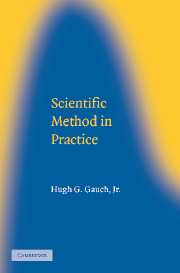Book contents
5 - DEDUCTIVE LOGIC
Published online by Cambridge University Press: 05 March 2015
Summary
This is the first of five chapters directed mainly at this book's primary goal of increasing productivity (the others being Chapters 6–9). Logic is the science of correct reasoning and proof, distinguishing good reasoning from bad. Logic sorts out the relationships that are fundamental in science, the relationships between hypotheses and evidence, between premises and conclusions.
In the context of logic, an “argument” is not a nasty dispute, but rather is a structured set of statements in which some statements, the premises, are offered to support or prove others, the conclusions. A deductive argument is valid if the truth of its premises entails the truth of its conclusions, and is invalid otherwise. Many deductive systems, including arithmetic and geometry, are developed on a foundation of predicate logic in the modern and unified vision of mathematics.
“The most immediate benefit derived from the study of logic is the skill needed to construct sound arguments of one's own and to evaluate the arguments of others” (Hurley 1994:ix). Every college offers courses in logic from its philosophy or mathematics faculty, and many fine introductory books on logic are available (such as Kearns 1988 and Hurley 1994). Unfortunately, most scientists never take such a course or read such a book.
Of course, given the simple premises that “All men are mortal” and “Socrates is a man,” one trusts scientists to reach the valid conclusion that “Socrates is mortal,” even without formal study of logic.
- Type
- Chapter
- Information
- Scientific Method in Practice , pp. 156 - 190Publisher: Cambridge University PressPrint publication year: 2002



